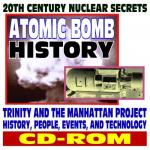|
This section contains 147 words (approx. 1 page at 300 words per page) |
Uranium is a dense, silvery metallic element with the highest atomic mass of any naturally occurring element. It is the forty-seventh most abundant element in the earth's crust. All of the isotopes of uranium are radioactive, which accounts for a portion of the background radiation that is a natural part of the environment. In the 1930s, scientists discovered that one isotope of uranium, uranium-235, could be fissioned, or split. This information brought about a revolution in human society. The potential for nuclear fission is demonstrated by the fact that it has made possible not only the world's most destructive weapons, but also the generation of energy in a new way. Regardless of the purpose for which it is used, nuclear fission has created severe waste disposal problems which the world is struggling to solve.
See Also
High-Level Radioactive Waste; Nuclear Power; Nuclear Weapons; Radioactive Waste; Radioactivity
|
This section contains 147 words (approx. 1 page at 300 words per page) |


